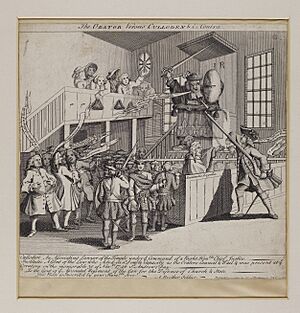John Henley (preacher) facts for kids
Quick facts for kids
John Henley
|
|
|---|---|

An old drawing of John Henley preaching.
|
|
| Born | 3 August 1692 |
| Died | 13 October 1756 (aged 64) |
| Nationality | English |
| Other names | Orator Henley |
| Occupation | Preacher Clergyman |
John Henley (born August 3, 1692 – died October 13, 1756) was an English clergyman. He was often called 'Orator Henley'. He was famous for his exciting speeches and unique personality.
Contents
Early Life and Education
John Henley was born in Melton Mowbray, England. His father was a vicar, which is a type of church leader.
He went to grammar schools in Melton and Oakham. After that, he studied at St John's College at the University of Cambridge. He earned a Bachelor of Arts (B.A.) degree there.
After college, Henley worked as an assistant teacher. Later, he became the head teacher at the grammar school in Melton Mowbray. He also helped out as a church assistant there.
Moving to London
In November 1721, John Henley earned a Master of Arts (M.A.) degree. He then moved to London, a much bigger city. In London, he became an assistant preacher. He also wrote several books during this time.
Henley had some disagreements with the Bishop of London. Because of this, he decided to leave his church job. He then started giving his own lectures. He called these lectures 'Orations'. These talks were about religious topics and everyday life. In 1723, he also became the Rector of Chelmondiston, a church leader in Suffolk.
The Oratory
On July 3, 1726, Henley opened his own special meeting place. He called it the 'Oratory'. This room was built above a meat market in Newport Market.
In 1729, he moved his Oratory to an old theater. This theater was in Clare Market, near Lincoln's Inn Fields. Here, he kept giving his speeches. He talked about "the world as it is, serious or ridiculous."
Henley believed that the true meaning of the Gospel was in its spirit and good actions. He said other things were "as sounding Brass, or as a tinkling Cymbal." His talks were very popular, but they sometimes caused noisy crowds.
Unique Services
Henley added many unusual things to his services. He created his own 'Primitive Liturgy'. This was a special prayer book. In it, he changed some traditional Christian statements. He used different ones from old church writings.
For his 'Primitive Eucharist' (a church meal), he used unleavened bread. He also used mixed wine. He even gave out special medals to people who came to his Oratory. These medals cost one shilling to get in.
Some visitors thought Henley cared too much about money. One person complained that they had to pay a shilling to get in. They felt it was strange to pay money just to worship God.
Public Opinion and Legacy
John Henley knew that he was the most unique part of his services. The famous writer Alexander Pope wrote about him. Pope called him a "great restorer of the good old Stage." He said Henley was "Preacher at once and Zany of thy age." A 'zany' is like a clown or a silly person.
Henley was a very good speaker. He used a dramatic style when he talked. He would change his voice and move his hands. His speeches were a mix of serious ideas and funny parts.
A newspaper called The Connoisseur wrote about him. They said he turned religion into a show. They thought he was like a "Jack-pudding," which means a silly performer, dressed in church clothes.
Despite what critics said, many Londoners liked the energetic 'Orator' Henley. His services were popular with people called Freethinkers. These were people who thought for themselves about religion. Henley himself said he wanted "to die a rational" person. He passed away in London on October 13, 1756.
Henley was often shown in drawings and pictures of his time. Artists like George Bickham the Younger and William Hogarth drew him.
Works
In 1714, John Henley wrote a poem. It was called Esther, Queen of Persia. People liked this poem very much.
From 1719 to 1721, he published a book series. It was called The Compleat Linguist. This book was a grammar guide for many important languages.
For several years, Henley also edited a weekly newspaper. It was called Hyp Doctor. This paper was written to go against another paper called Craftsman. In 1726, he published The Primitive Liturgy, which was the prayer book he used at his Oratory.
 | Ernest Everett Just |
 | Mary Jackson |
 | Emmett Chappelle |
 | Marie Maynard Daly |

